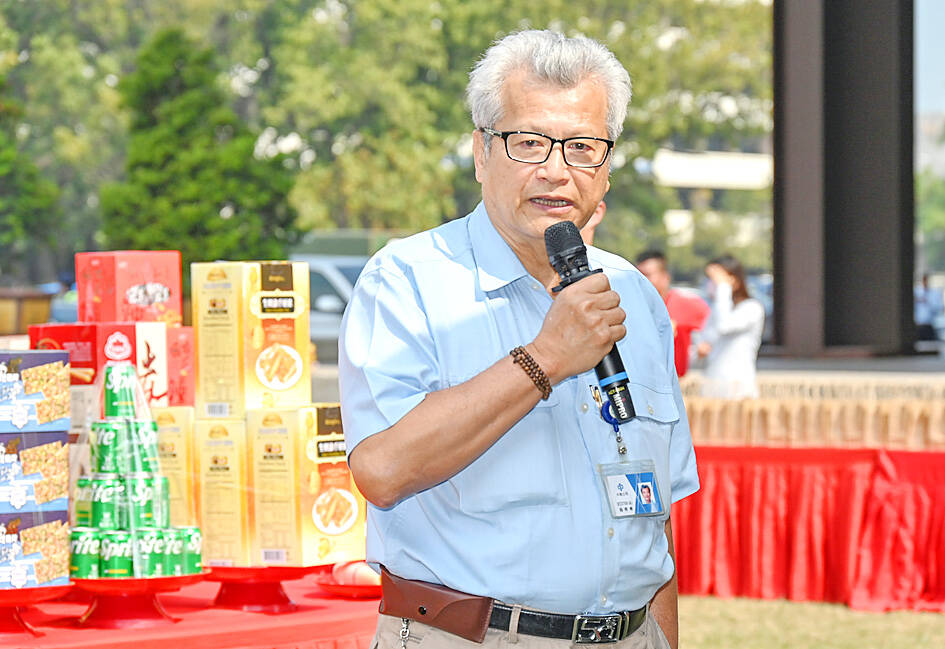China Steel Corp (中鋼), the largest steelmaker in Taiwan, yesterday said that it would raise prices moderately for some products and leave others flat for domestic deliveries next month.
The Kaohsiung-based steelmaker said it is to increase prices for cold and hot-rolled steel by NT$300 per tonne and keep prices unchanged for electrical steel, electro-galvanized steel sheets and other products.
The decisions came after a monthly price review to reflect the latest industrial and economic outlook at home and abroad, it said.

Photo courtesy of China Steel Corp
China Steel cited the IMF as saying that the world economy might expand 3.1 percent this year, from a 2.9 percent uptick last year, with the US to maintain a mild increase and Europe to emerge from a recession.
Regionally, China’s stimulus measures would lend support to its fragile economy and Taiwan’s exports would resume growth momentum, allowing the nation’s GDP growth to accelerate from 1.4 percent to 3.15 percent, the steelmaker said.
The trends are positive for steel demand as evidenced by last month’s healthy purchasing managers’ index in the US and the eased downturn in China, it said.
Beijing is encouraging investment to speed up urban renewal, social housing and infrastructure projects, boding well for the steel industry, it said.
Auto industry intelligence provider MarkLines is looking at a 2.7 percent increase in global vehicle sales from last year to 9.23 million this year, which is favorable for steel used in vehicles, it added.
As for steel supply, China’s steel stock and output last month dropped 26 percent and 23.3 percent year-on-year due to the market’s crude steel controls and output restrictions aimed at winter environment protections, it said, adding that the tightening measures explained why crude steel productions in December fell 14.9 percent to a seven-year low.
Furthermore, South Korea’s POSCO, one of the world’s largest steelmakers, is conducting annual maintenance this month and would cut its output by 1 million tonnes, it said.
Data compiled by the World Steel Association showed that crude steel production in December fell 5.3 percent for the 10th straight month to 135.7 million tonnes, positive for the steel market moving forward, it said.
As for raw material prices, iron ore last month cost about US$120 to US$130 per tonne while coking coal hovered at about US$310 to US$320 per tonne, relatively high to buttress steel prices, China Steel said, adding that the local currency’s earlier depreciation against the US dollar helped drive up prices for imports.
China Steel said it exercised restraint in pricing after taking into consideration the competitiveness of domestic firms downstream.
The pickup in steel prices is likely to be sustained given that first-tier peers POSCO this month raised its hot-rolled steel by US$38 per tonne, Japan’s Nippon Steel Corp increased by US$34 per tonne and China’s Baowu Steel Group Croup (寶武鋼鐵) hiked prices by US$14 per tonne, it said.

Intel Corp chief executive officer Lip-Bu Tan (陳立武) is expected to meet with Taiwanese suppliers next month in conjunction with the opening of the Computex Taipei trade show, supply chain sources said on Monday. The visit, the first for Tan to Taiwan since assuming his new post last month, would be aimed at enhancing Intel’s ties with suppliers in Taiwan as he attempts to help turn around the struggling US chipmaker, the sources said. Tan is to hold a banquet to celebrate Intel’s 40-year presence in Taiwan before Computex opens on May 20 and invite dozens of Taiwanese suppliers to exchange views

Application-specific integrated circuit designer Faraday Technology Corp (智原) yesterday said that although revenue this quarter would decline 30 percent from last quarter, it retained its full-year forecast of revenue growth of 100 percent. The company attributed the quarterly drop to a slowdown in customers’ production of chips using Faraday’s advanced packaging technology. The company is still confident about its revenue growth this year, given its strong “design-win” — or the projects it won to help customers design their chips, Faraday president Steve Wang (王國雍) told an online earnings conference. “The design-win this year is better than we expected. We believe we will win

Chizuko Kimura has become the first female sushi chef in the world to win a Michelin star, fulfilling a promise she made to her dying husband to continue his legacy. The 54-year-old Japanese chef regained the Michelin star her late husband, Shunei Kimura, won three years ago for their Sushi Shunei restaurant in Paris. For Shunei Kimura, the star was a dream come true. However, the joy was short-lived. He died from cancer just three months later in June 2022. He was 65. The following year, the restaurant in the heart of Montmartre lost its star rating. Chizuko Kimura insisted that the new star is still down

While China’s leaders use their economic and political might to fight US President Donald Trump’s trade war “to the end,” its army of social media soldiers are embarking on a more humorous campaign online. Trump’s tariff blitz has seen Washington and Beijing impose eye-watering duties on imports from the other, fanning a standoff between the economic superpowers that has sparked global recession fears and sent markets into a tailspin. Trump says his policy is a response to years of being “ripped off” by other countries and aims to bring manufacturing to the US, forcing companies to employ US workers. However, China’s online warriors